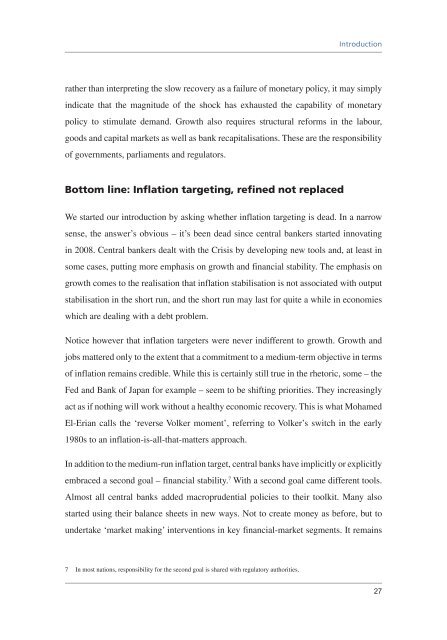Is inflation targeting dead? Central Banking After the Crisis - Vox
Is inflation targeting dead? Central Banking After the Crisis - Vox
Is inflation targeting dead? Central Banking After the Crisis - Vox
You also want an ePaper? Increase the reach of your titles
YUMPU automatically turns print PDFs into web optimized ePapers that Google loves.
Introductionra<strong>the</strong>r than interpreting <strong>the</strong> slow recovery as a failure of monetary policy, it may simplyindicate that <strong>the</strong> magnitude of <strong>the</strong> shock has exhausted <strong>the</strong> capability of monetarypolicy to stimulate demand. Growth also requires structural reforms in <strong>the</strong> labour,goods and capital markets as well as bank recapitalisations. These are <strong>the</strong> responsibilityof governments, parliaments and regulators.Bottom line: Inflation <strong>targeting</strong>, refined not replacedWe started our introduction by asking whe<strong>the</strong>r <strong>inflation</strong> <strong>targeting</strong> is <strong>dead</strong>. In a narrowsense, <strong>the</strong> answer’s obvious – it’s been <strong>dead</strong> since central bankers started innovatingin 2008. <strong>Central</strong> bankers dealt with <strong>the</strong> <strong>Crisis</strong> by developing new tools and, at least insome cases, putting more emphasis on growth and financial stability. The emphasis ongrowth comes to <strong>the</strong> realisation that <strong>inflation</strong> stabilisation is not associated with outputstabilisation in <strong>the</strong> short run, and <strong>the</strong> short run may last for quite a while in economieswhich are dealing with a debt problem.Notice however that <strong>inflation</strong> targeters were never indifferent to growth. Growth andjobs mattered only to <strong>the</strong> extent that a commitment to a medium-term objective in termsof <strong>inflation</strong> remains credible. While this is certainly still true in <strong>the</strong> rhetoric, some – <strong>the</strong>Fed and Bank of Japan for example – seem to be shifting priorities. They increasinglyact as if nothing will work without a healthy economic recovery. This is what MohamedEl-Erian calls <strong>the</strong> ‘reverse Volker moment’, referring to Volker’s switch in <strong>the</strong> early1980s to an <strong>inflation</strong>-is-all-that-matters approach.In addition to <strong>the</strong> medium-run <strong>inflation</strong> target, central banks have implicitly or explicitlyembraced a second goal – financial stability. 7 With a second goal came different tools.Almost all central banks added macroprudential policies to <strong>the</strong>ir toolkit. Many alsostarted using <strong>the</strong>ir balance sheets in new ways. Not to create money as before, but toundertake ‘market making’ interventions in key financial-market segments. It remains7 In most nations, responsibility for <strong>the</strong> second goal is shared with regulatory authorities.27














